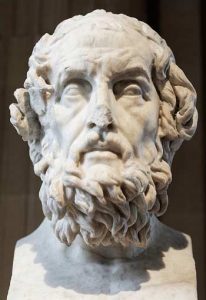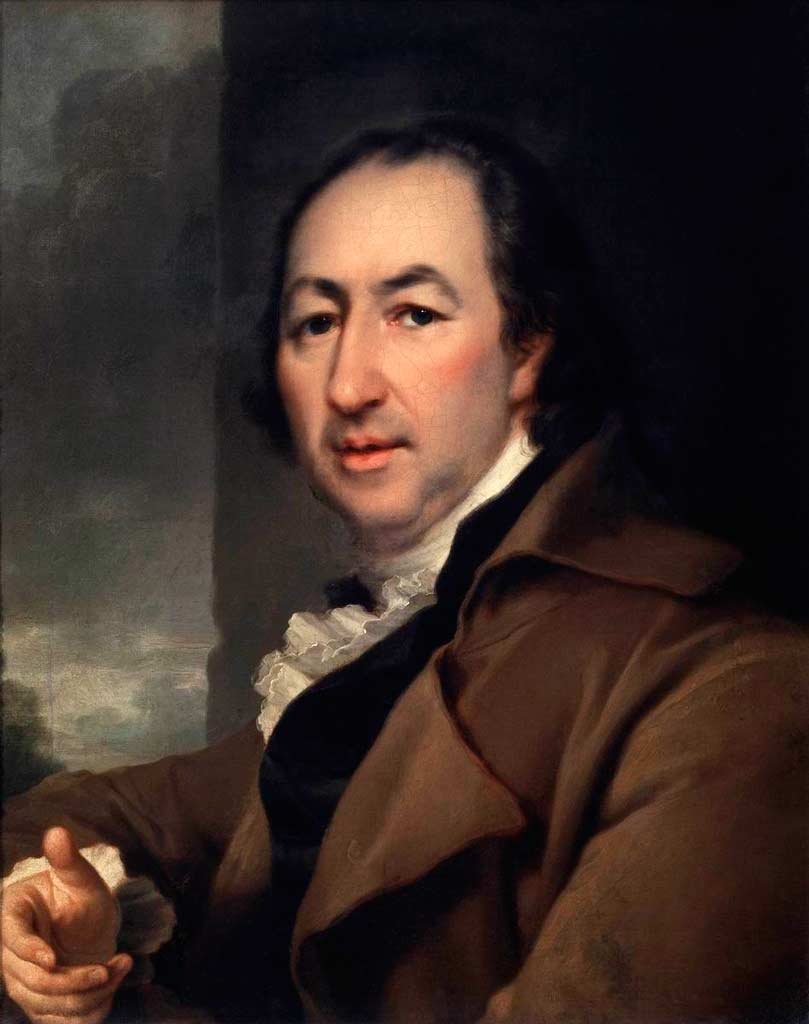Homeric epic
 Epic means nothing more than a word about exploits (in Greek “epic” – “word”), songs that were performed by wandering singers. To the accompaniment of the lyre, they were sung or aed – the songwriter, or the rhapsodist – the performer and collector of heroic tales.
Epic means nothing more than a word about exploits (in Greek “epic” – “word”), songs that were performed by wandering singers. To the accompaniment of the lyre, they were sung or aed – the songwriter, or the rhapsodist – the performer and collector of heroic tales.
Tradition considers the creator of the ancient Greek epic of Homer, a blind stray aed, a beggar singer. Already in ancient Greece, his name was surrounded by legends. Many later considered this name to be a household name. “Homer” in one of the Greek dialects means “blind.” Many scientists, not understanding how one person could create verbally and keep in memory thousands of poems of the Iliad and Odyssey, questioned the existence of Homer himself (see Homer’s question).
For us, the main thing is not the personality of Homer, but those greatest poems that are associated with his name. These poems were formed in the IX – VII centuries. BC er They were recorded, as is commonly believed, in the VI. BC er The myths on the basis of which these poems are created go back to hoary antiquity and, undoubtedly, are the creation of the people. However, the completion of the poems and their artistic decoration show that they took their final form on the eve of the emergence of the slave-owning formation, at the time when the communal-clan system was dying.
The heroic epic originated on the coast of Asia Minor and the nearby islands. It was created mainly in a special, Ionian dialect (common Greek language appears in Greece only in the 4th-3rd centuries BC). The Iliad (see its summary and full text) and Odyssey (see summary and full text) are included in the so-called Trojan mythological cycle, which combines a number of myths that reflect the struggle of the Greeks to master the Asia Minor city of Ilio, or Troy .
The Iliad depicts several episodes from the tenth year of the siege of Troy; “Odyssey” – homecoming of one of the Greek heroes, Odyssey.
For a long time, these events were considered purely mythical, legendary, although the Greeks themselves stubbornly repeated that the Trojan War was about (in our calculus) in the XII century. BC er In the 70s of the XIX century. German G. Schliemann, a lover of antiquity and a very rich man, with the help of leading scientists, carried out excavations on the territory of supposed Troy, on the Gissarlyk hill in Asia Minor. The excavations gave the richest results. Scientists could say with certainty that a large and rich city really burned at this place, burned down by enemies (traces of several fires were well preserved). Things found during the excavations were striking in their luxury, the finest work on gold and silver, and very much resembled utensils and expensive items described in Homer’s poems.
Excavations continued on the mainland of Greece, in Mycenae and Tiryns, where the tombs of the most ancient leaders – Basileus, or kings, many gold items and other treasures were found. This confirmed the Homeric view of the “gold-rich” Mycenae. So, gradually the Trojan War and the campaign of the Greeks acquired real traits. Now it is considered established, which is approximately in the XII century. BC er Achaean tribes (information about the powerful state of Ahiyava reached us even from Asia Minor) set off for Troy in search of new lands and wealth. However, when the Achaeans conquered Troy and returned to their homeland, they were oppressed by the tribes of Dorians who had come from the north, who were more culturally backward and with a lower social order. Dorians conquered the Achaeans. However, the memory of the great last feat of the Achaean tribe lived among the people, and songs about the heroes of the Trojan War gradually began to take shape. The Dorians, who considered themselves descendants of Hercules, who also once besieged Troy, saw in the epos about the Trojan War the glorious past of their ancestors.
When Attica and Athens took the lead in Greece, the Athenians also tied up the exploits of the sons of their hero, Theseus, with this war. Thus, it turned out that all the Greek tribes in the Homeric epic had a work that glorified their great past, equally dear and eternal for all.
The Greeks have repeatedly sought to Asia Minor. Already in the VII – VI centuries. BC er its coast and nearby islands were colonized by the Greek Ionians, and it was the cradle of Homer’s epic.
It is also interesting to note that the Homeric epic reflected in itself an even more ancient culture, namely the culture of the island of Crete, which flourished on the eve of the spread of the Achaean tribes in the 13th – 12th centuries. BC er In Homer, you can find many elements of life, society, reminiscent of this ancient culture. When deciphering the so-called linear letter “B”, it turned out that the Cretan inscriptions mention the names of the heroes known from the epos of Homer, as well as the names of the gods, which were always considered purely Greek. When these letters are fully read, perhaps they will open before us a new world of the pre-Homer’s epic, which served as a poetic example for Homer and a collection of ancient legends.



